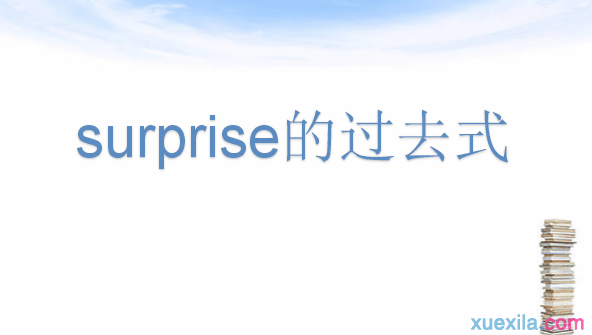surprise的过去式和用法例句
surprise做动词有使惊奇;使惊喜;突然袭击等意思,那么你知道surprise的过去式是什么吗?下面跟着小编一起来学习一下吧。
surprise的过去式和其他时态:
过去式: surprised
过去分词: surprised
现在分词: surprising
surprise的用法:
surprise的用法1:surprise的基本意思是“使惊奇”,指未曾预料的或空前的事物使人产生某种惊讶感或诧异感,强调始料不及或缺乏准备,引申可表示对未做防范的人采取行动或揭露其试图掩盖的事实。用于军事上可指袭击,但不表示是否袭击成功。
surprise的用法2:surprise是及物动词,其宾语常是人称代词。接名词、代词或以现在分词充当补足语的复合宾语。
surprise的用法3:surprise后接介词at表示“对…感到惊讶”; 后接介词from表示“出其不意使…说了”; 后接介词into表示“出其不意地使人…”; 后接介词with表示“以…使(某人)惊奇”。
surprise的用法4:surprise的现在分词和过去分词都可用作形容词,在句中作表语或定语。surprise的现在分词作表语时含主动意义,主语一般是物。常采用以it作形式主语的结构,其真正主语由that引出。surprise的过去分词作表语时含被动意义,主语一般是人,后接由介词at引导的短语、动词不定式或that/wh-从句,表示“对…感到惊奇”。

surprise的过去式例句:
1. He was surprised they had married — they had seemed so different.
他俩居然结婚了——这让他非常惊讶,因为他们实在是太不一样了。
2. The duke was surprised by his wife's omission from the guest list.
公爵对他的夫人未在获邀宾客之列感到意外。
3. My voice surprised me; it was even and emotionless.
我的声音听起来心平气和、不露一丝感情,这让我自己颇感惊讶。
4. He was surprised by the venomous tone of the anonymous calls.
那些匿名电话的恶毒语气很令他吃惊。
5. She was surprised at the urgency in his voice.
他语调中透着急迫,这让她很吃惊。
6. Were you surprised that his disease progressed so quickly?
他的病情发展得这么快,您是否感到意外?
7. "I don'tagree," she said, surprised at the strength in her own voice.
“我不同意,”她说道,对自己的声音如此响亮有力而感到惊讶。
8. I would be surprised, actually, if he left Birmingham.
如果他要离开伯明翰,说真的,我会很惊讶。
9. Anne was both flattered and surprised by Danny's attentiveness to her.
丹尼的大献殷勤让安妮受宠若惊。
10. Liam surprised his tutors by twice failing a second year exam.
利亚姆两次都没能通过大二的一门考试,这让他的导师们很吃惊。
11. I was surprised at the cross-section of people there.
那里的一些典型人物让我感到惊讶。
12. Chang seemed surprised to find the big living-room empty.
张看到偌大的客厅里空无一人,似乎很惊讶。
13. We were rather surprised by their sporting and correct behaviour.
他们富有体育精神而且举止得体,让我们感到相当惊讶。
14. She was hitting on me and I was surprised and flattered.
她在挑逗我,这让我感到既惊讶又受宠若惊。
15. "Dr Campbell," he said, clearly surprised. "What are you doing here?"
“坎贝尔医生,”他显然很惊讶地说道,“您怎么在这儿?”